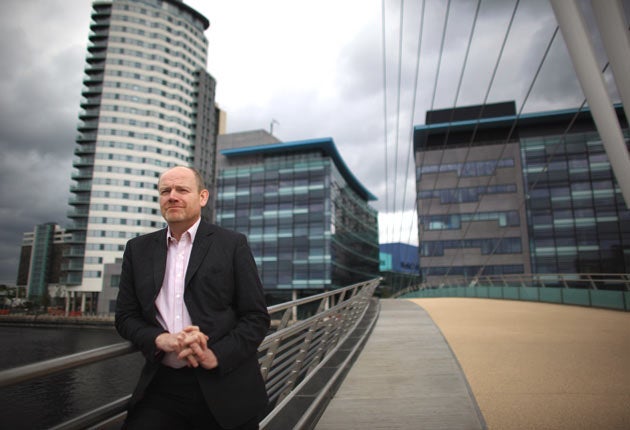Refresh zones and collaboration pods at BBC's new hub
Jonathan Brown visits the Salford HQ – and asks if David Brent thought of the concepts

David Brent would have loved it. But not even The Office's comic management mastermind could ever have envisaged the existence of the hooded collaboration pod.
Yet from Monday the term will pass into the everyday lexicon of the English workplace when staff begin reporting for duty at the BBC's new £200m Salford HQ to find the demise of the unloved meeting room and the rise of the covered conversation capsule.
While their refusenik colleagues may have eschewed the allure and generous resettlement package aimed at persuading them to move to Manchester and its sister city, the first of 2,300 employees due to take up employment in the state-of-the-art office and studio complex will find themselves entering a strangely soothing, colour-coordinated environment.
Aimed at creating what corporation bosses claim will be the most dynamic and egalitarian workplace in the world, even the director of BBC North, Peter Salmon, will sit among staff in the open-plan management suite on the fourth floor of Quay House. There he will be able to while away idle moments taking in sweeping views across the soon-to-be built set for Coronation Street or the Theatre of Dreams at Old Trafford. But staff looking for more focused activity will instead be encouraged to gather not in the traditional confines of closed office spaces but instead to brainstorm ideas in one of the 28 "hooded collaboration pods" which line the corridors. The units, which seat two, are said to be cheaper than individual offices as well as fostering the interplay of ideas across departmental boundaries.
Described as having an "allotment or garden-feel" emphasising sustainability and recycling, for the creative spaces designers have chosen magenta – a colour popular with Matisse – to signify collaborative zones, while a lilac green marks out the more practical "resource areas" – aka the photocopier and locker room.
While there were none of the much-parodied bean bags or Apple Macs on display yesterday there was no shortage of break-out areas, squat stools, black-lacquered kitchens or "refresh-zones" as well as quiet "Twitter pods". Although all talk of "hot-desking" is strictly forbidden, the BBC confirmed that it had "no intention to allocate any one desk to any one person". "History walls" have also been erected bearing catchphrases and motifs from the BBC's glory days.
The light and airiness of the northern centre is good news for BBC staff, an additional 1,000 of whom it emerged yesterday could eventually be deployed to work at the MediaCity Complex on the banks of the Manchester Ship Canal. Director general Mark Thompson, who was unveiling the new facilities, said no part of the BBC would be exempt from consideration for relocation despite a series of high- profile refusals by talent and key staff unwilling to make the journey up the M6. Mr Thompson and Mr Salmon said that despite claims in the media that staff were unhappy at the prospect of change, 55 per cent had accepted a relocation package worth up to £45,600.
They said 2,500 BBC employees not earmarked for the move had taken the initiative and volunteered to go to Salford. The people of the North West are also eagerly anticipating the arrival of the national broadcaster at the site where it is the key tenant along with the University of Salford and ITV. More than 50,000 have already applied for the 500 new posts due to be created there.
Over the next 36 weeks Salford will become home to BBC Sport, Breakfast, Radio 5 Live and children's programming.
Mr Thompson indicated that future career prospects for those that staked out their career in Salford would be rosy. "I believe 20 years from now the BBC will be run by people who have cut their teeth here," he said.
Is the Cheshire Set ready for its new neighbours?
Senior corporation executives relocating to the north might be able to scrape together the kind of seven figure sums required to gain them access to the desirable Cheshire villages beloved of Premier League footballers and their Wags.
The majority of BBC workers can be assured that their relocation allowance goes more than half way towards buying them a decent two-bed flat in nearby suburbs. Transport links are excellent. It is just 15 minutes by tram from the centre of Manchester while a stroll across the dockside brings you to the Lowry arts centre and the Imperial War Museum North. The shopping mall on site might feel subdued compared to Westfield but there are all the usual chains available. For a lunch-time jog try Peel Park along the River Irwell, while hardier souls might even be tempted into a spot of open water swimming in the clean disused docks.
Those missing the cultural pull of London will be cheered by the Manchester International Festival which begins next month.
Subscribe to Independent Premium to bookmark this article
Want to bookmark your favourite articles and stories to read or reference later? Start your Independent Premium subscription today.

Join our commenting forum
Join thought-provoking conversations, follow other Independent readers and see their replies